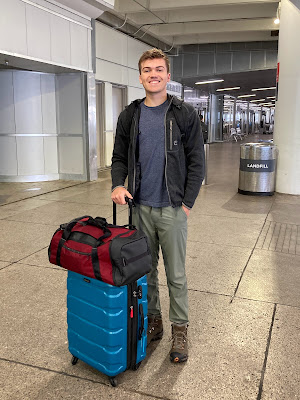Arrival at Mpala
Hello again everyone!
I have arrived in Kenya safely and after spending a day in Karen (a suburb of Nairobi), I am now at Mpala!
While in Karen, I stayed with one of my Uncle Dino’s friends, Steve. Steve is a lifelong butterfly researcher and houses a remarkable specimen collection. The collection accounts for over 95% of the total species of butterfly on the continent of Africa (Image 1a/1b) and plays an instrumental role in preserving the biodiversity of butterflies, as well as for conservation efforts such as the sequencing of butterfly genomes. While staying with Steve, I was also able to meet Dino’s friend, Paula. Paula is a filmmaker as well as elephant expert, and listening to the three of them talk over dinner is not something I will soon forget.
Aside from the collection, Steve also houses one of the sweetest furry friends I have ever met: Borris. While only 24 hours into my journey, I have made two lifelong friends in Borris and Dudu (Dino's dog). As you can see in images 2a and 2b, both Borris and Dudu are very photogenic.
After saying goodbye to Steve and Borris, Dino and I travelled North of Nairobi for about 5 hours to reach Mpala. We stopped at the Cape Chestnut restaurant on the way, where I was able to meet more of Dino’s friends who run the restaurant and are highly involved in the local community of Nanyuki (where the restaurant is also located). Although the meal at Cape Chestnut was delicious, it was the chocolate mousse that stole the show and gave us the energy to finish the drive.
After an incredible lunch, Dino, Dudu and I hopped in the car and finished the journey to Mpala. This last part of the drive left my jaw dropped so far to the floor that it was left dragging along the bumpy road. In just the 20 or so minutes spent on that road before arriving at Mpala, I saw baboons, dik diks, impalas, plains zebras, Grevy's zebras, vulturine guinea fowl (pictured in Image 3) and reticulated giraffes (a species of giraffe native to northern Kenya and pictured in Image 4).
Once arriving at Mpala, Dino and I sat down for a cup of tea as we watched over the land from the back porch. After a few moments of enjoying the birds at the bird bath and the dik diks running through, a group of Grevy’s zebras came up to graze along the back porch. The Grevy’s zebra is an endangered species of zebra in Kenya and has different characteristics than the plains zebra that most people know. As pictured in Image 5, a plains zebra even came up with the group in order to allow me to show all of you how they are different. The most notable differences are that the plains zebra (left/below in Image 5) has stark, thick black and white stripes along its body and is smaller in stature compared to the Grevy's. The Grevy’s zebra on the other hand, has thinner and more uniform stripes than the plains zebra. The zebras also vary slightly in coloration, and the stripes of the Grevy’s zebra do not wrap all the way around its body (as you can see in Image 6), leaving a white belly exposed. Lastly, right before I went back to the dormitory to get settled in, I spotted a bush hyrax hiding in the rocks (Image 7).
I know that looking back on this post in a few weeks, I will laugh at myself, knowing that this was just the tip of the biodiversity iceberg. Even that awareness, however, could not take away from the awe that I felt (and am still feeling) upon arrival.
Until next time!
Charlie
 |
| Image 2a: Selfie with my friend Dudu |
 |
| Image 3: Vulturine guineafowl (male) |
 |
| Image 4: Reticulated giraffe bull |
 |
| Image 5: A plains zebra (left/bottom) and a Grevy's zebra (right/top) |
 |
| Image 6: Grevy's zebra |




